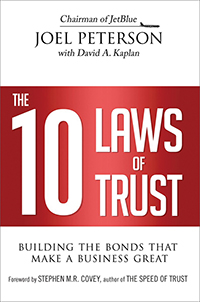
Relevant for everyone from CEOs to entry-level employees, the book contains a set of 10 laws bound by three variations to improve your business environment and results through the careful cultivation of trust, which here is defined as having reached a mutually supportive atmosphere where colleagues are secure “allowing others to safely and reliably act on our behalf.” The laws are a checklist for cultivating trust within operating groups, and the authors detail them in order to create a sequence for success in the methodical development of trust and the streamlined workflow and other organizational improvements that should follow. They are:
- Start with personal integrity.
- Invest in respect.
- Empower others.
- Measure what you want to achieve.
- Create a common dream.
- Keep everyone informed.
- Embrace respectful conflict.
- Show humility.
- Strive for win-win negotiations.
- Proceed with care.
According to Peterson and Kaplan, parties who follow the checklist must also possess the character, competence, and authority to execute at the highest level of trust. To reveal how this level is achieved, they drill down into the three types of trust: reciprocal, representative, and pseudo-trust, all of which can be used to distinguish false trust from genuine and beneficial trust.
Motivation is cited as the indicator of what level of trust an organization has. Families motivated by duty and love are presented as examples of the highest trust, while the lowest levels, or pseudo-trust, are shown in groups sharing common enemies. 10 Laws is dense, with a very high concept-per-page ratio, but for anyone willing to devote some time to the material, it’s a beneficial read with an accessible, replicable outline for establishing better business through trust.

April 2019



